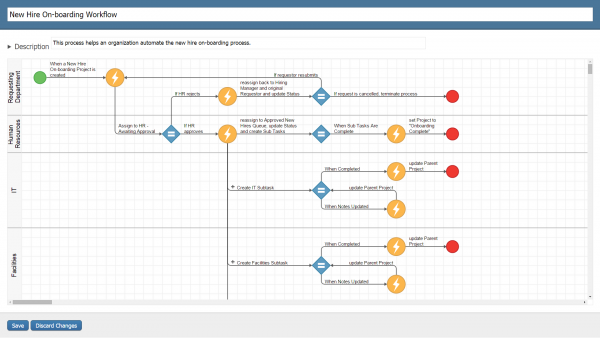BPM Adoption By Law Firms Increases Profitability

Forward-thinking law firms looking at the big picture are increasingly starting to adopt and benefit from the use of Business Process Management (BPM). BPM as a principle aims at making organizations more efficient and adaptable, which are both key for any law firm to continue to thrive in today’s rapidly digitizing legal market.
When people think of BPM, it is typically associated with large corporations, specifically in the technological or manufacturing fields, which may lead law firm managers or administrators to overlook it as an option. However, the same BPM principles that are effective with larger organizations can, and should, be applied to organizations of any size.
If anything, an organization such as a law firm could benefit from the increased efficiency that BPM can provide compared to a traditional case management approach. In reality, all of the work done by law firms are a series of processes. A case itself is simply a set of processes that are worked through. This is why it is important for law firms to recognize the need to not just “manage cases”, but more importantly, to understand and be able to adjust the processes behind the cases and the rest of the organization.

There are an overwhelming number of case management software options available for law firms, however BPM goes beyond case management. Many of these are effective at doing just that: organizing and tracking legal cases for the firm, which is of course necessary for any law firm. However, law firms are limiting themselves by settling on a case management “solution” that may be somewhat effective at managing cases, but fails to deliver any additional value.
Case management software can help them keep track of the cases that they already have. A BPM solution, on the other hand, can help a firm analyze those cases and the processes behind them to improve the management of future cases, increase performance and productivity, while improving quality standards.
The use of BPM by law firms also provides additional benefits to the law firm as a whole through integrating all aspects of the management, administration, and communication within the law firm and with clients. BPM allows the flexibility for law firms to manage all of their internal and external processes through adaptable workflow models, rather than trying to adjust their processes to work with a limited case management software. BPM providers such as JobTraQ, IBM, and Oracle, are all tapping into the lucrative legal market with gusto!

Improving process efficiency within a law firm allows the attorneys and other staff within the firm to focus on actually practicing law. By implementing set processes, all employees of the organization can quickly and easily know where they fit into each process and are able to prioritize and complete their tasks more efficiently.
The office manager or partners can also more easily identify and assess areas for business process improvement as well as potential growth. An effective software solution for law firms should offer more than just a place to input details about a case. It should be able to be leveraged effectively by all levels of the organization as a way to improve the processes that make a law firm successful.
Amira Chugunova is a process improvement geek and tech blogger with a focus on Business Process Management, Lean, and Six Sigma methodologuies applied to transactional environments.
